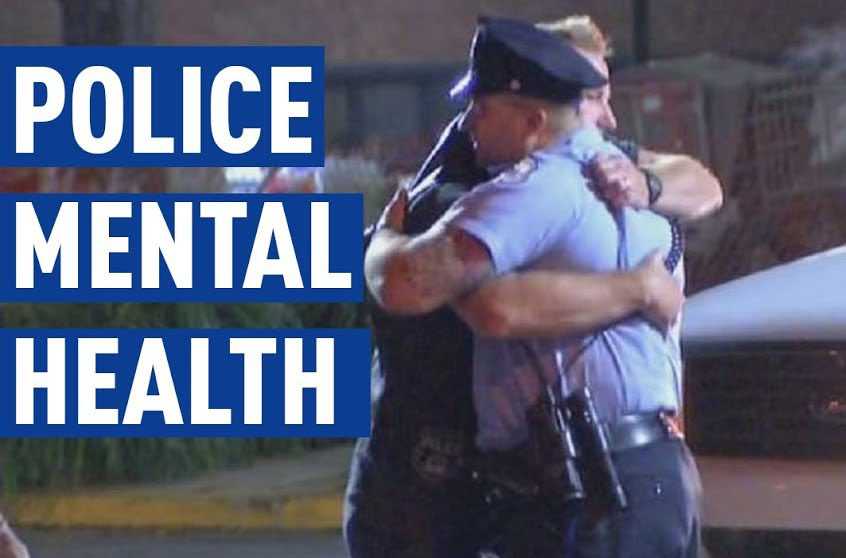Our mental health encompasses emotional, social, physical, and psychological feelings of wellbeing. When we are relaxed, find joy in our day-to-day lives, and have our social and emotional needs balanced we can handle a multitude of stressors that may be encountered as police officers. National Police Week occurs during a month dedicated to mental health. As such, there are many resources, events, and programs online and in person that are linked at the bottom of this bulletin. In this safety tip we will examine several ways to recognize signs of mental fatigue and distress in yourself and co-workers. We will also discuss tips and strategies to improve outcomes. Exercising the mental parts of our bodies is just as important in self-care as going to the gym to improve our physical bodies.
day-to-day lives, and have our social and emotional needs balanced we can handle a multitude of stressors that may be encountered as police officers. National Police Week occurs during a month dedicated to mental health. As such, there are many resources, events, and programs online and in person that are linked at the bottom of this bulletin. In this safety tip we will examine several ways to recognize signs of mental fatigue and distress in yourself and co-workers. We will also discuss tips and strategies to improve outcomes. Exercising the mental parts of our bodies is just as important in self-care as going to the gym to improve our physical bodies.
Mental illness, mental fatigue, and mental breakdown, are some of the terms used to describe the state of a person who is struggling with coping in daily life or work pressures. All of us have stressors that occur at home, at work, and in life. Police work has particularly heightened stressors that come as a nature of the occupation. Working long hours, dealing with difficult people, fear for physical safety. Even being in a vehicle for many hours or temperature conditions can cause acute and long-term stress that may lead to mental fatigue. If we can bring awareness to ourselves, how we are feeling, how we are handing stressors and practice techniques to lessen this mental fatigue, and/or know when to ask for help, we can then reduce burnout, absences, and suicides and improve policing in our departments.
Signs of Mental Fatigue – Awareness in the Body
Fatigue – When in a chronic state of stress, our brains and bodies are using more energy to cope with what is happening to us. The neurons in our brains begin to fire at a rapid pace, our hearts beat faster, and muscles tense up. When we have good mental health, our body systems return to normal quite quickly once the stress is removed. However, when it doesn’t return to baseline, we will become quite fatigued. Even after a good night of sleep you may feel tired all the time. Chronic fatigue is a symptom of mental fatigue. Take time to stop, observe, and seek help if you recognize this symptom in yourself or fellow officers.
Muscle and Nerve Pain – Just like our brains go into overdrive during experiences of stress, our physical bodies do something similar. We may hold our muscles in certain areas tighter, notice shoulders or rib cage feels tight, breathing is less controlled. Lactic acid and cortisol begin to build up and you may feel pains such as pinching or burning sensations in joints and muscles, particularly in the region of the neck and shoulders. Left untreated, this can lead to musculoskeletal injuries and chronic pain. Take time to stop and observe how your body is feeling on a day-to-day basis. How does your posture feel? Do you feel tight or loose? Check your range of motion with arms, shoulders, and hips.
Everyday Practices to Improve Mental Health
Finding Time for Joy – We all have things that make us feel relaxed, happy, creative, calm, and give us the brain and body experience of joy. In a hectic and stressful busy-life it can be hard to carve out time for things we enjoy such as taking a walk, playing music, spending time with friends and family and other things. Make time for joy a priority in daily life.
Physical Exercise – Human beings are designed to be moving. Sitting, standing, and driving for long periods of time are activities police officers participate in. Making any kind of physical exercises a priority in your daily life will increase your happy hormones (serotonin), boost your mood with increased oxygen to your brain and cells, and reduce stress in the body.
Talk to Someone – Meaningful social relationships contribute to the reduction of stress and improve our mental muscles. Having a partner, friend, or colleague to talk to about your day is important. Many of us hold things in and feel uncomfortable talking about our challenges and stressors but this is part of having good social relationships including the ability to share as well as listen. This provides each person with the benefit of feeling heard and understood and provides an opportunity to lend guidance to one another. Professional mental health counselors are now available with a variety of access like online, phone, groups, and in-person. Reach out to someone if you feel that you need more than a talk with a friend.
In this week to honor the vital work of our police departments, we recognize the incredibly important and difficult jobs that you all have. We appreciate all you do and hope these short safety bulletins will be a reminder of our appreciation and be helpful towards improving the safety of the department. We recognize National Police Week!
Resources on Mental Health and Links:
Tips to Boost Mental Health: First Responders Live: https://www.emergency-live.com/of-interest/10-tips-on-how-to-boost-your-mental-health-become-the-best-version-of-yourself/
SAMSHA – Suicide Prevention: https://www.samhsa.gov/suicide
NYS Alliance on Mental Illness: https://www.naminys.org/nys/mental-health-awareness-month/

